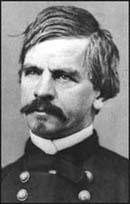Nathaniel Banks

Nathaniel Banks was born in Waltham, Massachusetts, on 30th January, 1816. After a brief education he worked as a bobbin boy in a cotton factory.
Banks became a journalist and edited a weekly paper in Waltham before studying law and being admitted to the bar. A member of the Democratic Party, he served in the Massachusetts legislature (1849-53). Banks was a strong opponent of the Kansas-Nebraska and this eventually resulted in him joining the Republican Party.
In 1855 Banks was elected to the House of Representatives before becoming governor of Massachusetts in 1858. Banks was initially opposed to the American Civil War. Lincoln managed to persuade Banks to change his mind and in 1861 appointed him Major General of Volunteers. He was now the fourth highest ranking officer in the army, junior to only Winfield Scott, John C. Fremont and George McClellan. This angered senior army officers as Banks had no military experience.
In the summer of 1862 Banks was defeated by Thomas Stonewall Jackson in the Shenandoah Valley. He was given the command of the Military District of Washington before succeeded General Benjamin Butler at the Department of the Gulf in October, 1862. His attempt to open the Mississippi River from the South ended in failure. His military inexperience also resulted in the deaths of a large number of soldiers at Port Hudson, Louisiana (July 1863). His Red River expedition (March-May, 1864) also ended in failure when he was defeated by Edmund Kirby-Smith.
After these series of military set-backs, Banks was replaced by Major General Edward Canby and he returned to the House of Representatives. After the American Civil War, Banks was a staunch opponent of the reconstruction policies of President Andrew Johnson. Elected to Congress in 1865, 1866, 1868 and 1870, Banks also served as U.S. marshal for Massachusetts (1879-88). Nathaniel Banks died in Waltham, Massachusetts, on 1st September, 1894.

